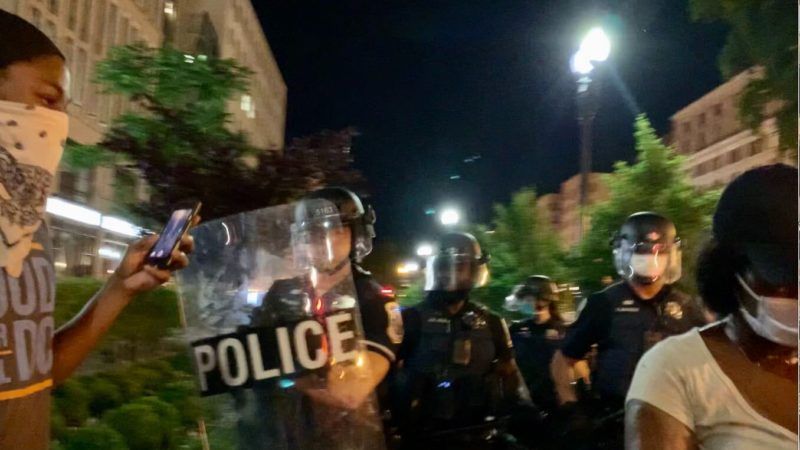Videos Show Police Aggression Against Protesters Across the Country. Here Are Two Ways To Help It Stop.
Plus: the return of the "outside agitator" narrative, Trump can't designate Antifa a terror group, and more...

As Americans emerged from quarantine to protest police brutality—and as protesters in many cities were joined by opportunistic vandals and looters—politicians have imposed rules that only exacerbate tensions between cops and communities.
Urban leaders across the U.S. imposed curfews last night. In Philadelphia, for instance, residents got little notice before being told a citywide curfew was going into effect from 6 p.m. until 6 a.m. In D.C., the curfew went from 11 p.m. to 6 a.m., with the National Guard called in to help with enforcement. In Tennessee, the governor issued a statewide curfew from just after 8 p.m. until 5 a.m.
Nonetheless, protests continued apace, producing yet more law enforcement horror stories. Here's a small sampling:
https://twitter.com/ShutUpAndrosky/status/1267222613350219777
I just got hit by a rubber bullet near the bottom of my throat. I had just interviewed a man with my phone at 3rd and Pine and a police officer aimed and shot me in the throat, I saw the bullet bounce onto the street @LAist @kpcc OK, that's one way to stop me, for a while pic.twitter.com/9C2u5KmscG
— Adolfo Guzman-Lopez (@AGuzmanLopez) June 1, 2020
7️⃣4️⃣ Minneapolis, MN: police responding to a medical emergency – a tanker truck deliberately running over protestors – nonetheless stop to casually pepper-spray folks from the comfort of their SUVs
— T. Greg Doucette (@greg_doucette) June 1, 2020
https://twitter.com/drivenbyboredom/status/1267263490009546753
8️⃣1️⃣ El Paso, TX: police fire teargas and bullets into peaceful crowd of unarmed protestors
— T. Greg Doucette (@greg_doucette) June 1, 2020
7️⃣9️⃣ Minneapolis, MN: police deliberately shoot at a German news crew, live on-air
Notice the "PRESS" in all-caps on both sides of the reporter's vest
— T. Greg Doucette (@greg_doucette) June 1, 2020
A lot more examples here and here. See also, from Reason:
- "Nation's Cops Seem Determined To Demonstrate Why People Are Protesting Them in the First Place"
- "D.C. Cops Kept Herding Protesters Into Harm's Way"
- "I Got Tear Gassed at Baltimore's City Hall"
- "Police and Rioters Get Violent at Protests Nationwide"
While a lot of leaders take steps guaranteed to make tensions worse, a few legislators are getting to work on substantive ways to fix our criminal justice system so that cops can't kill with impunity.
Rep. Justin Amash (L–Mich.) says he will be introducing legislation to end qualified immunity for police officers. "This week, I am introducing the Ending Qualified Immunity Act," Amash tweeted on Sunday, attaching a letter he was distributing to colleagues in the House of Representatives. Qualified immunity "was created by the Supreme Court in contravention of the text of the statute and the intent of Congress," he writes to them. "It is time for us to correct their mistake."
Amash's letter explains:
As part of the Civil Rights Act of 1871, Congress allowed individuals to sue state and local officials, including police officers, who violate their rights. Starting in 1967, the Supreme Court began gutting that law by inventing the doctrine of qualified immunity. Under qualified immunity, police are immune from liability unless the person whose rights they violated can show that there is a previous case in the same jurisdiction, involving the exact same facts, in which a court deemed the actions to be a constitutional violation.
This rule has sharply narrowed the situations in which police can be held liable—even for truly heinous rights violations—and it creates a disincentive to bringing cases in the first place.
This is one of the big reasons police are often able to hurt people without consequence.
"The brutal killing of George Floyd by Minneapolis police is merely the latest in a long line of incidents of egregious police misconduct," writes Amash. "This pattern continues because police are legally, politically, and culturally insulated from consequences for violating the rights of people whom they have sworn to serve."
(See also: "The Supreme Court Has a Chance To End Qualified Immunity and Prevent Cases Like George Floyd's.")
Meanwhile, Sen. Brian Schatz (D–Hawaii) says he'll introduce legislation to demilitarize the police:
I will be introducing an amendment to the National Defense Authorization Act to discontinue the program that transfers military weaponry to local police departments.
— Brian Schatz (@brianschatz) May 31, 2020
QUICK HITS
Periodic reminder that millennials are now the largest voting-age generation in the USA and have the power to vote them all out. https://t.co/kDA1WK4YlL
— Sahil Kapur (@sahilkapur) June 1, 2020
• The rise and fall and rise again of the "outside agitator" narrative.
• Trump has no authority to designate Antifa a "domestic terrorist group" (and it's a bad idea anyway).
• Supreme Court update:
No action from #SCOTUS on any of the qualified immunity or gun case petitions, meaning those will be considered again at a later conference. https://t.co/QUFYRFgnH6
— Chris "Law Dork" Geidner (@chrisgeidner) June 1, 2020
• "The swabs that were performed over the last 10 days showed a viral load in quantitative terms that was absolutely infinitesimal compared to the ones carried out a month or two months ago," said Italian doctor Alberto Zangrillo, head of the San Raffaele Hospital in Italy's hardest-hit region.
• COVID-19 has been "slamming the consequences" of insitutional racism home "as we die at a significantly higher rate than whites, are the first to lose our jobs, and watch helplessly as Republicans try to keep us from voting," writes Kareem Abdul-Jabbar in the Los Angeles Times.
